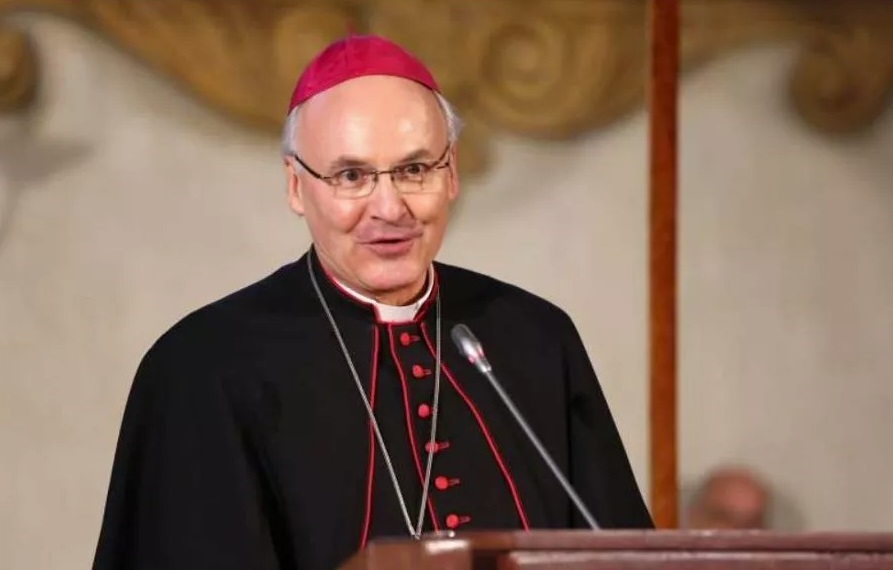REGENSBURG (GERMANY)
National Catholic Register - EWTN [Irondale AL]
September 30, 2021
The German bishops’ conference initially said that the process would end with a series of “binding” votes — raising concerns at the Vatican that the resolutions might challenge the Church’s teaching and discipline.
A German Catholic bishop suggested this week that the country’s “Synodal Way” is using the abuse crisis to reshape the Church on Protestant lines.
Bishop Rudolf Voderholzer of Regensburg questioned why the German Catholic Church’s progress in tackling abuse was seldom acknowledged, reported CNA Deutsch, CNA’s German-language news partner.
He said: “The fact that interested parties now continue to pretend that nothing has actually happened so far, that without a valid comparison of institutions and without a historical classification of the cases of abuse, the peculiarities of the Catholic Church are systemically blamed for it, feeds my suspicion that the sexual abuse is being instrumentalized here in an attempt to reshape the Catholic Church along the lines of Protestant church orders, where ‘synod’ means something different than in the Catholic Church, namely a kind of church parliament.”
Bishop Voderholzer, a professor of dogmatics, made the comment while preaching at Vespers at Regensburg Cathedral on Sept. 26.
The bishop is a prominent critic of the “Synodal Way,” a multi-year process bringing together bishops and lay people to discuss four main topics: the way power is exercised in the Church; sexual morality; the priesthood; and the role of women.
The German bishops’ conference initially said that the process would end with a series of “binding” votes — raising concerns at the Vatican that the resolutions might challenge the Church’s teaching and discipline.
Bishops and theologians have expressed alarm at the process, which is expected to end in February 2022, but bishops’ conference chairman Bishop Georg Bätzing has vigorously defended it.

In his sermon, Bishop Volderholzer recalled that he and Cologne Cardinal Rainer Maria Woelki had proposed an alternative set of statutes for the Synodal Way in August 2019 that was rejected by a majority of German bishops.
He said that the alternative statues stressed the importance of the new evangelization, mission, and catechesis, in accordance with a 19-page letter that Pope Francis sent to German Catholics in June 2019.
In his letter, the Pope called for evangelization in the face of a “growing erosion and deterioration of faith.”
“Every time an ecclesial community has tried to get out of its problems alone, relying solely on its own strengths, methods, and intelligence, it has ended up multiplying and nurturing the evils it wanted to overcome,” he wrote.
Earlier this month, Bishop Voderholzer launched a new website that presented an alternative to the text endorsed by members of the Synodal Way’s Forum I, focused on the way power is exercised in the Church.
The 36-page document, called “Authority and Responsibility” and translated into English, is the first in a series that will also address the topics of the other three synodal forums.
The text was co-authored by Father Wolfgang Picken, dean of the city of Bonn, Marianne Schlosser, a theology professor in Vienna, Austria, journalist Alina Oehler, and Augsburg auxiliary Bishop Florian Wörner.
Speaking in Rome on Sept. 17, the influential German theologian Cardinal Walter Kasper praised the alternative text,
The 88-year-old former president of the Pontifical Council for Promoting Christian Unity said that text adopted by members of the Synodal Way attempted “to reinvent the Church in the face of the crisis with the help of an erudite theological structure.”
“There is much that is correct in it, but also much that is hypothetical. In the end, many wonder whether all this is still entirely Catholic,” he commented.
Preaching on Sunday, Bishop Volderholzer quoted Cardinal Kasper extensively, expressing his agreement with the theologian considered to be close to Pope Francis.
Bishop Volderholzer’s intervention came on the eve of a plenary session of the Synodal Way in Frankfurt, southwestern Germany, on Sept. 30-Oct. 2.
The event is the second meeting of the Synodal Assembly, the Synodal Way’s supreme decision-making body.
The assembly consists of the German bishops, 69 members of the powerful lay Central Committee of German Catholics (ZdK), and representatives of other parts of the German Church.
A group of German Catholics presented a new reform manifesto on Sept. 29, reported CNA Deutsch.
The Arbeitskreis Christliche Anthropologie (Christian Anthropology Working Group) published the manifesto online. It called for a new start in the German Church, arguing that the Synodal Way was failing to offer authentic reform “in a dramatic fashion.”
Pope Francis addressed fears about the trajectory of the Synodal Way in an interview with the Spanish radio station COPE aired on Sept. 1.
Asked if the initiative gave him sleepless nights, the Pope recalled that he wrote an extensive letter that expressed “everything I feel about the German synod.”
Responding to the interviewer’s comment that the Church had faced similar challenges in the past, he said: “Yes, but I wouldn’t get too tragic either. There is no ill will in many bishops with whom I spoke.”
“It is a pastoral desire, but one that perhaps does not take into account some things that I explain in the letter that need to be taken into account.”
